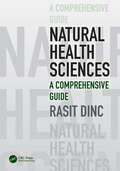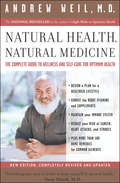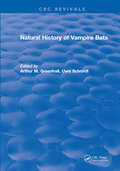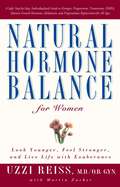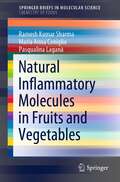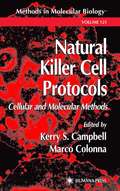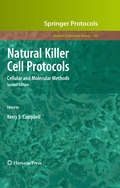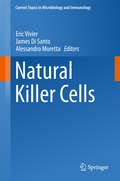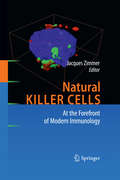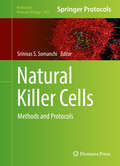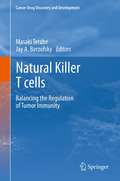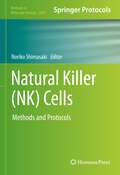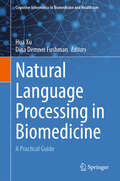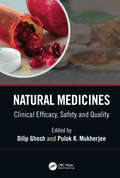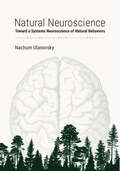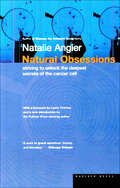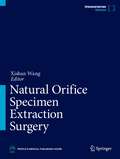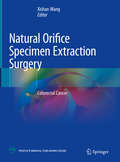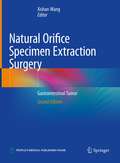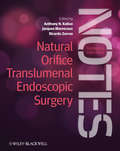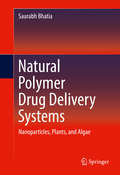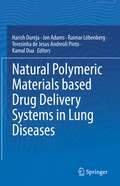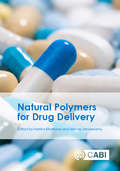- Table View
- List View
Natural Health Sciences: A Comprehensive Guide
by Rasit DincNatural Health Sciences: A Comprehensive Guide serves as a valuable resource for both healthcare practitioners and business professionals, supporting ongoing professional development by bridging the gap between proponents of traditional or natural health systems and those who follow scientific or medical perspectives. The book synthesizes existing literature and fosters a more nuanced understanding of the benefits and limitations of natural health practices.By presenting academic and scientific evidence in an accessible format, it offers evidence-based insights into a broad spectrum of natural health approaches. These include herbal remedies, nutritional strategies, lifestyle interventions, and alternative therapies, covering key areas such as Ayurveda, bioenergetic therapy, music therapy, Traditional Chinese Medicine (TCM), and aromatherapy. It also addresses criticisms, ethical and regulatory concerns, and the future of natural health sciences.With the increasing awareness of the limitations and side effects of conventional medicine, people are seeking natural, preventive, and personalized approaches to maintain and improve their health. Natural Health Sciences: A Comprehensive Guide provides a comprehensive overview of natural health sciences and its various sub-disciplines, allowing readers to gain a deeper understanding of these practices and make informed decisions about their health.
Natural Health, Natural Medicine: The Complete Guide to Wellness and Self-Care for Optimum Health
by Andrew T. WeilThe bible of natural medicine" (Larry Dossey, M.D.), Natural Health, Natural Medicine is a comprehensive resource for everything you need to know to maintain optimum health and treat common ailments. This landmark book incorporates Dr. Weil's theories of preventive health maintenance and alternative healing into one extremely useful and readable reference, featuring general diet and nutrition information as well as simple recipes, answers to readers' most pressing questions, a catalogue of home remedies, invaluable resources, and hundreds of practical tips. This new edition includes up-to-the-minute scienti c ndings and has been expanded to provide trustworthy advice about low-carb diets, hormone replacement therapy, Alzheimer's, attention de cit disorder, re ux disease, autism, type 2 diabetes, erectile dysfunction, the u, and much more.
Natural History of Vampire Bats
by Arthur M. GreenhallA major problem with vampire bats is that whatever information exists is scattered throughout the literature or is not recorded. There are some excellent books on the ecology and biology of bats with very little on vampire bats. This volume fills that gap to provide an in-depth presentation of these unique animals.
Natural Hormone Balance for Women
by Martin Zucker Uzzi ReissA pioneering gynecologist and antiaging specialist with a successful Beverly Hills practice, Dr. Uzzi Reiss shows the way for women who want to turn back the effects of time through natural hormone therapy, but who wonder: is it safe? Does it work? Is hormone therapy right for me? NATURAL HORMONE BALANCE for Women is Dr. Reiss's breakthrough, step-by-step program for women who want to take control of their lives by restoring hormonal balance. This revolutionary, commonsense natural hormone replacement program is designed to meet the individual needs of most women looking to rejuvenate body and mind -- and offers astounding benefits for women of all ages: More energy and stamina * Improved memory * Healthier, more youthful skin * Balanced moods * Less depression and anxiety * Stabilization of weight and more muscle definition * Better sleep patterns * PMS and menopausal symptoms reduced or eliminated * Enhanced sexuality Dr. Reiss takes the confusion out of the medical information you need to know. In clear, nontechnical language, he thoroughly explains: the important difference between standard chemical hormone prescriptions and natural hormone replacements which hormone replacements are best for you and how to adjust them to your maximum individual benefit how to take hormones without worry how to choose the most effective hormonal gel, cream, pill, or sublingual drops, and when to use them. Dr. Reiss has helped thousands of women transform their lives by achieving natural hormone balance. Now you can tap into the replenishing "fountain of youthfulness" that is not only essential for better life, but easier and safer to achieve than ever before.
Natural Inflammatory Molecules in Fruits and Vegetables (SpringerBriefs in Molecular Science)
by Pasqualina Laganà Ramesh Kumar Sharma Maria Anna ConiglioThis book explores the role that some natural molecules found in fruits and vegetables, and their derivatives, play in excessive oxidation reactions that lead to inflammation in the human body. Particular attention is given to oxidation during food processing, especially when it comes to high-energy foods (derived from cereals) with notable amounts of oxidation-sensible lipids and protein chains. This book critically assesses the increased consumption of high-energy foods from a public health perspective. In addition, it provides an overview of the research into the unsaturated fatty acids and polypeptides responsible for nitric oxide production and elucidates the analytical identification of natural inflammatory molecules in fruits and vegetables. The book appeals not only to academic researchers and professors interested in public hygiene and food safety; medicine; food production; HACCP studies, but also to public health practitioners, and regulatory specialists and consultants.
Natural Killer Cell Protocols
by Marco Colonna Kerry S. CampbellKerry S. Campbell and Marco Colonna have assembled a comprehensive collection of readily reproducible methods designed to study natural killer (NK) cells from the broadest variety of viewpoints. These include not only classic techniques, but also new approaches to standard methods, newly evolved techniques that have become valuable for specific applications, and unique models for manipulating and studying NK cells. Among the advanced methods covered are those for in vitro transendothelial migration, in vivo detection of cells migrating into tumors, immunofluorescence staining of intracellular cytokines, and in vitro NK cell development. Valuable techniques for specific applications include vaccinia virus protein expression, soluble KIR-Fc fusions for HLA class I binding assays, calcium mobilization in cell conjugates, and identification of heterodimeric receptor complexes using cDNA library expression cloning. Natural Killer Cell Protocols: Cellular and Molecular Methods offers immunologists, cancer researchers, virologists, and cell biologists today's most comprehensive collection of both established and cutting-edge techniques, methods that will contribute significantly to advancing our understanding of this fascinating and critically important class of cells.
Natural Killer Cell Protocols
by Kerry S. CampbellAs the research has continued, it has become increasingly clear that natural killer (NK) cells are critical sentinels of the innate immune response, playing important roles in protecting the body from numerous pathogens and cancer in addition to contributing to normal pregnancy and impacting the outcomes of transplantation. While the first edition provided a valuable collection of classical cellular and in vivo techniques to study NK cell functions, the Second Edition of "Natural Killer Cell Protocols: Cellular and Molecular Methods" brings together more recently developed methods, more refined techniques, and detailed protocols designed to study NK cells within specialized tissue sites in both mice and humans. In this collection of methods, international leaders in the field cover topics ranging from the analysis of the various stages of NK cell development and maturation to specialized techniques for the identification of ligands for NK cell receptors. This volume also includes an appendix, providing a rich resource summarizing available reagents to study NK cells, cross-referencing KIR nomenclature, and detailing the many HLA ligands for various KIR family members. As a volume in the highly successful Methods in Molecular BiologyTM series format, chapters include introductions to their respective topics, lists of the necessary materials and reagents, step-by-step, readily reproducible laboratory protocols, and thorough notes sections, highlighting tips on troubleshooting and avoiding known pitfalls. Comprehensive and cutting-edge, "Natural Killer Cell Protocols: Cellular and Molecular Methods, Second Edition" seeks to aid researchers and further advance our understanding of the functions, maturation, and regulation of these fascinating and dynamic cells.
Natural Killer Cells
by Eric Vivier James Santo Alessandro MorettaTocelebrate the 40th anniversary of the discovery of Natural Killer (NK) cells,this volume focuses on the recent advances in our understanding of NK cell developmentand differentiation and their acquisition of functional properties, as well asthe latest models for NK-cell analysis in mice and applications in clinicalmedicine. NK cells have travelled a circuitous path from their initialdescription as 'spontaneous killers' (for some simply an experimental artifact)to being a bona fide subset of innatelymphoid cells with a complementary mode of action in immune defense and animportant mediator of immune reactivity in health and disease. Together, thesereviews provide a timely and concise picture of the evolution of NK cells asessential agents in immunity and as potent weapons against disease. This bookoffers an appealing and insightful resource for scientists and clinicians.
Natural Killer Cells
by Jacques ZimmerNatural killer (NK) cells have been at the forefront of immunology for two decades. During that time, a great amount of information about these cells has been obtained. They are important in antiinfectious and antitumoral defense and shape the adaptive immune response. In addition, they can act as immunoregulatory cells. In recent years, the therapeutic potential of NK cells in cancer immunotherapy has become increasingly evident. This book describes in detail current knowledge about NK cells and covers a broad range of NK cell-related topics, including those that are not frequently reviewed, e.g. NK cells and allergy or NK cells and skin diseases.
Natural Killer Cells
by Srinivas S. SomanchiThis volume contains a collection of research Natural Killer Cell methodologies relevant for both basic and translational research. These methodologies present new developments in the natural killer (NK) cell field, such as understanding the influence of NK cells metabolism on its function, identifying complexity of NK cell subsets through mass cytometry, and determining the emergence of memory NK cells in murine model of MCMV infection. Methods that study NK cells migration and cytotoxicity through endpoint analysis or live single cell imaging are also discussed. Chapters also describe methods pertaining to translational application of NK cells, such as "ex vivo" expansion of NK cells on K562 cell lines genetically modified to express either membrane bound IL-15 or membrane bound IL-21, large scale NK cell culture, current techniques for engineering NK cells to express chimeric antigen receptors of chemokine receptors using retroviral vectors, electroporation of mRNA, and the natural phenomenon of trogocytosis. Written in the highly successful "Methods in Molecular Biology "series format, these chapters include introductions to their respective topics, lists of the necessary materials and reagents, step-by-step readily reproducible laboratory protocols, and tips on troubleshooting and avoiding known pitfalls. Cutting edge and thorough, "Natural Killer Cells: Methods and Protocols "is a valuable resource for researchers who not only want to understand mechanisms that govern NK cell behavior and diversity, but who also want to understand how to systematically evaluate NK cells for adoptive immunotherapy applications.
Natural Killer T cells
by Masaki Terabe Jay A. BerzofskyThis book will cover primary roles of NKT cells in immunity to cancer, in both mouse tumor models and cancer patients. There are several chapters describing general aspects of NKT cells.
Natural Killer: Methods and Protocols (Methods in Molecular Biology #2463)
by Noriko ShimasakiThis detailed book provides a broad collection of methodologies for natural killer (NK) cell research. Beginning with an assortment of methods for the isolation of NK cells and NK cell differentiation, the volume continues with methodologies for functional tests, such as cytotoxicity, viral infection, and metabolism assays, as well as clinical applications of NK cells. Written for the highly successful Methods in Molecular Biology series, chapters include introductions to their respective topics, lists of the necessary materials and reagents, step-by-step, readily reproducible laboratory protocols, and tips on troubleshooting and avoiding known pitfalls. Authoritative and practical, Natural Killer (NK) Cells: Methods and Protocols serves as an ideal guide for researchers looking to contribute to the further development of basic and clinical NK cell research.
Natural Language Processing in Biomedicine: A Practical Guide (Cognitive Informatics in Biomedicine and Healthcare)
by Hua Xu Dina Demner FushmanThis textbook covers broad topics within the application of natural language processing (NLP) in biomedicine, and provides in-depth review of the NLP solutions that reveal information embedded in biomedical text. The need for biomedical NLP research and development has grown rapidly in the past two decades as an important field in cognitive informatics. Natural Language Processing in Biomedicine: A Practical Guide introduces the history of the biomedical NLP field and takes the reader through the basic aspects of NLP including different levels of linguistic information and widely used machine learning and deep learning algorithms. The book details common biomedical NLP tasks, such as named entity recognition, concept normalization, relation extraction, text classification, information retrieval, and question answering. The book illustrates the tasks with real-life use cases and introduces real-world datasets, novel machine learning and deep learning algorithms, and large language models. Relevant resources for corpora and medical terminologies are also introduced. The final chapters are devoted to discussing applications of biomedical NLP in healthcare and life sciences. This textbook therefore represents essential reading for students in biomedical informatics programs, as well as for professionals who are conducting research or building biomedical NLP systems.
Natural Medicines: Clinical Efficacy, Safety and Quality
by Dilip Ghosh Pulok K. MukherjeeGlobally, natural medicine has been considered as an important alternative to modern allopathic medicine. Although natural medicines are popular in society, only limited medicinal herbs have been scientifically evaluated for their potential in medical treatment. This book connects various aspects of the complex journey from traditional medicine to modern medicine. It provides information on topics including global regulations and regulatory hurdles, diverse nutritional challenges and potential health benefits, novel food innovations especially seed-to-clinic approaches, and future trends. FEATURES • Provides information on sustainable use of natural products in the development of new drugs and clinically validated herbal remedies • Discusses issues on evaluation and clinical aspects of herbal medicine, promotion and development, safety evaluation, metabolite profiling, biomarker analysis, formulation, and stability testing • Describes traditional uses of natural medicine through identification, isolation and structural characterization of their active components • Elucidates mechanisms of biological action, adverse effects and identification of their molecular targets of natural medicine • Multidisciplinary appeal including chemistry, pharmacology, pharmacognosy and cell and molecular biology, as well as integration with clinical medicine This book serves as an essential guide for individuals researching natural medicines, and industry employees in areas including drug development, pharmacology, natural products chemistry, clinical efficacy, ethnopharmacology, pharmacognosy, phytotherapy, phyto-technology and herbal science.
Natural Neuroscience: Toward a Systems Neuroscience of Natural Behaviors
by Nachum UlanovskyA new approach to brain research that emphasizes studying the brain under naturalistic conditions.Natural neuroscience departs from the classical reductionist approach, which emphasizes control at the expense of natural behaviors, by proposing a shift toward real-world relevance, natural behaviors, and ecological validity. In Natural Neuroscience, Nachum Ulanovsky presents the conceptual, empirical, and technological underpinnings that enabled this new field. Natural neuroscience researchers posit that when studying any brain region in any animal, whether standard mammalian species such as rodents and primates or nonstandard species, it is crucial to pursue the animal&’s natural behaviors and to consider the natural problems it needs to solve. By preventing rich natural behaviors, says Ulanovsky, we miss key aspects of brain function—and we may not even know what we miss.The author surveys recent studies that have begun to move in this direction across multiple subfields of neuroscience, including sensory, cognitive, social, and behavioral neuroscience. He discusses technological advances that are allowing the pursuit of more naturalistic experiments, including methods for recording neural activity in freely behaving, freely moving animals (e.g., wired and wireless electrophysiology and imaging); methods for manipulating neural activity in freely moving animals (e.g., wired and wireless optogenetics); and methods for quantifying the details of behavior. He makes connections across the four major scientific disciplines that focus on understanding behavior—neuroscience, behavioral ecology, ethology, and psychology—bringing them closer together, and closer to real life.
Natural Obsessions: Striving to Unlock the Deepest Secrets of the Cancer Cell
by Natalie AngierThis classic work of science writing chronicles the search for the origins of cancer—with a new introduction by the Pulitzer Prize–winning author.In Natural Obsessions, acclaimed science writer Natalie Angier holds a microscope up to the agony and ecstasy of scientific research. Angier spent close to a year observing the work of two prominent biologists—MIT’s Robert Weinberg and Michael Wigler of the Cold Spring Harbor Laboratory—as they each doggedly pursue the mysteries of the cancer cell. Delving into the drama of scientific inquiry, Angier captures life inside the lab, opening a rare window into how scientists think, feel, and behave.Originally published in 1988, this edition of Natural Obsessions includes a new introduction by Angier as well as a foreword by the physician, poet, and author Lewis Thomas.
Natural Obsessions: The Search for the Oncogene
by Lewis Thomas Natalie AngierThe discovery of these genes and their role in human malignancy has been one of the most dramatic events in biology in the late twentieth century. In this book, Angier describes scientist Bob Weinberg, his research lab, and the dozens of scientists who work towards understanding the oncogene. She describes the dynamic of the lab and its workers as well as the details of each gene experiment.
Natural Orifice Specimen Extraction Surgery
by Xishan WangWith the rapid development of surgical techniques, minimally invasive surgery has become the focal point of medical innovation technology. This book aims to introduce a comprehensive and advanced techniques of natural orifice specimen extraction surgery (NOSES). Firstly, the development process and the current status of NOSES worldwide were described. Secondly, various surgical procedures of NOSES in gastrointestinal, hepatobiliary, splenopancreatic, urogynecologic and general surgeries were elaborated, including indications and contraindications, detailed surgical steps, technical key points and operational skills. Thirdly, controversial hot topics, technical difficulties and key issues for each surgical procedure were discussed. Experience and lessons learned in practical application were also shared by experts in different fields. It is not only suitable for the gastrointestinal surgeons but also surgeons working in gastrointestinal, hepatobiliary, splenopancreatic, and urogynecologic surgeries.
Natural Orifice Specimen Extraction Surgery: Colorectal Cancer
by Xishan WangThis introduces the theoretical and practical guide of NOSES. The book introduced 10 different techniques of NOSES for colorectal neoplasms based on extensive high-quality surgical images. The first part mainly describes the development process of NOSES and the current achievements of these techniques which will provide readers a general understanding of NOSES. The second part elaborates on ten different surgical procedures specific to position of tumor location of NOSES in detail. All key technical points and operational skills regarding to NOSES are displayed by both high-quality images. The indications and contraindications are also strictly determined in this book. In addition to the elaboration of NOSES, each chapter of this book also conduct a detailed and comprehensive analysis the hot spots, technical difficulties and key issues with regard to laparoscopic surgery for colorectal cancer. This book is suitable for the colorectal cancer surgeons and doctors of general surgery.
Natural Orifice Specimen Extraction Surgery: Gastrointestinal Tumor
by Xishan WangThis book introduces readers to nine techniques for natural orifice specimen extraction surgery (NOSES) in gastric cancer and fifteen different techniques for NOSES in colorectal cancer, respectively, based on extensive high-quality surgical images. The first part mainly describes the development process of NOSES and preoperative preparation,offering readers a general understanding of NOSES. In turn, the second and third parts elaborate on the surgical procedures for gastrointestinal cancer. All key technical points and operational skills regarding NOSES are covered, and the indications and contraindications are clearly defined. In addition, the book provides a detailed and comprehensive analysis of the hot spots, technical difficulties and key issues with regard to laparoscopic surgery for gastrointestinal cancer. Accordingly, it offers an essential guide for gastrointestinal cancer surgeons and general surgeons.
Natural Orifice Translumenal Endoscopic Surgery
by Anthony N. Kalloo Ricardo Zorron Facs, Hon Jses Jacques Marescaux Hon Frcs, Facs, Hon Jses Jacques FrcsAre you interested in using NOTES to treat your patients? Do you need a multimedia tool to guide you through all aspects of clinical management? Just as laparoscopic surgery revolutionized surgical practice in the 1980's and 90's, offering genuine competition to traditional open surgery, Natural Orifice Translumenal Endoscopic Surgery (NOTES) presents a genuinely different alternative for surgeons and patients alike as we move forward in the 21st century. Advantages over laparoscopic surgery include lower anesthesia requirements, faster recovery and shorter hospital stays, avoidance of transabdominal wound infections, less immunosuppression, better postoperative pulmonary and diaphragmatic function and of course, the potential for "scarless" abdominal surgery. Combining high-level text with a superb companion website, Natural Orifice Translumenal Endoscopic Surgery (NOTES): Textbook and Video-Atlas provides you with a hands-on, in-depth and practical multimedia tool on this exciting breakthrough, to consult either on the ward or in surgery. Highlights include: Full coverage of the fundamentals of NOTES, its current clinical applications and techniques, and future perspectives Over 50 outstanding videos illustrating NOTES being performed by the experts Full-color throughout and superbly illustrated with over 250 figures Edited by global leaders and pioneers in the field, who have recruited a world-class contributor team As well being a valuable text for gastroenterologists, GI surgeons and general surgeons, Natural Orifice Translumenal Endoscopic Surgery (NOTES): Textbook and Video-Atlas will also appeal to urologists, urologic surgeons, gynecologists, gynecologic surgeons, thoracic and ENT surgeons.
Natural Polymer Drug Delivery Systems
by Saurabh BhatiaThis book describes 200 bio-polymers, including the most recent and advanced nanotechnology applications. The applications of various bio-medical and other future potential uses are covered and examined in depth. Systematic discussion of current leading natural polymers is also included.
Natural Polymeric Materials based Drug Delivery Systems in Lung Diseases
by Jon Adams Kamal Dua Raimar Löbenberg Harish Dureja Terezinha de Jesus Andreoli PintoThis book comprehensively reviews the recent developments of natural polymers for drug delivery systems in various lung disorders. The initial chapter provides a brief introduction to lung diseases with a focus on the current landscape of natural polymers and trends in understanding the disease pathology. Several chapters of the book devoted to the latest technologies and advances in drug delivery systems include practical solutions on designing more effective drug delivery systems based on natural polymers that can be used in the management of lung diseases. Further, the book presents biodegradable and bio-reducible- natural polymers- based drug delivery systems for lung diseases. Towards the end, the book examines future prospects and challenges of natural polymers-based drug delivery systems in combating lung diseases. This book is useful for phytochemists, formulation/drug delivery, biological and translational researchers and clinicians working in the field of lung disorders.
Natural Polymers for Drug Delivery
by Ram Prasad Neerupma Dhiman Monika Joshi Deepshikha Pande Katare Wong Tin Wui Anirbandeep Bose Ali Demir Sezer Erdal CevherNatural polymers have been utilized extensively in food, pharmaceuticals, cosmetics, textiles, oil drilling and paint industries. Their non-toxic and inexpensive attributes readily enhance their commercial acceptability and make them potent agents in lieu of synthetic polymers. This book explores the opportunistic utility of natural polymers in developing effective drug delivery systems and provides a comprehensive and up-to-date analysis of their source, chemical structure and mechanism of action. Covering novel polymers for drug delivery - in particular extracts from plants, microorganisms and proteins, as well as water soluble and water insoluble biodegradable polymers - it presents an encyclopaedic overview of natural polymers': - quintessential roles in binding drugs towards enhancing bioavailability - modification and derivatization for targeted delivery - role as active drugs Natural Polymers for Drug Delivery is an invaluable resource for researchers, students and industrial scientists in the fields of biochemistry, chemistry, pharmacology and food science.
Natural Polymers for Drug Delivery
by Harsha Kharkwal Srinivas JanaswamyNatural polymers have been utilized extensively in food, pharmaceuticals, cosmetics, textiles, oil drilling and paint industries. Their non-toxic and inexpensive attributes readily enhance their commercial acceptability and make them potent agents in lieu of synthetic polymers. This book explores the opportunistic utility of natural polymers in developing effective drug delivery systems and provides a comprehensive and up-to-date analysis of their source, chemical structure and mechanism of action. Covering novel polymers for drug delivery - in particular extracts from plants, microorganisms and proteins, as well as water soluble and water insoluble biodegradable polymers - it presents an encyclopaedic overview of natural polymers': - quintessential roles in binding drugs towards enhancing bioavailability - modification and derivatization for targeted delivery - role as active drugs Natural Polymers for Drug Delivery is an invaluable resource for researchers, students and industrial scientists in the fields of biochemistry, chemistry, pharmacology and food science.
